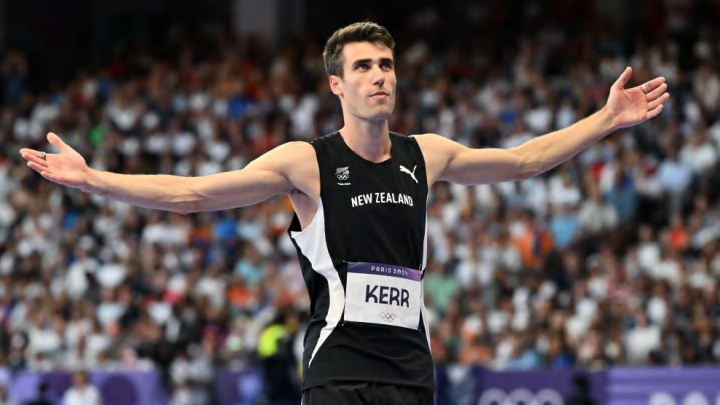New Zealand's Hamish Kerr Bet on Himself to Take High Jump Gold

SAINT-DENIS, France — A few months ago, Hamish Kerr started thinking about jump-offs. He had watched from just a few feet away as Mutaz Essa Barshim, of Qatar, and Gianmarco Tamberi, of Italy, decided to share gold in the men’s high jump at the Tokyo Olympics rather than continuing to compete, and Kerr thought it was “such a special moment for the sport,” he said. But earlier this year, a fellow member of Team New Zealand asked him what he would do in their spot. And Kerr realized he would want a different sort of moment.
“I think adding to the history of the sport in a different way than what’s already been done, that’s quite cool,” Kerr said on Saturday, shortly after getting that very chance. “I think that for me, I would have been so proud coming second in a jump-off—probably prouder than sharing the gold medal, knowing that it already happened.”
It’s one thing to say that when you are shooting the breeze with your teammates. It’s something else entirely, when you and American Shelby McEwen have each cleared 2.36 meters and have each failed to clear 2.38, to stare down an International Olympic Committee official who is offering you an Olympic gold medal and say, “No thanks. I’d rather take a 50% chance at silver.”
But Kerr said he had no second thoughts. “And I’m pretty sure Shelby was in the same mindset, because we just looked at each other,” he said. “And it was pretty simple. We both just nodded and off we went.”
Well, McEwen was a bit more willing to consider alternatives, he admitted afterward. “At some point, I kind of got fatigued,” he said with a smile. “I might have shared it with him. But I agreed to it and it was all good.” He added, “I wasn’t gonna go back and forth and argue with them or talk to him. He just wanted to jump off and I was all in for it.”
They each missed again at 2.38, then at 2.36. Two hours after they’d begun—and after a pause to watch the wild men’s 4 x 400-meter relay—McEwen missed at 2.34. And to the relief of the nearly 77,000 at the Stade de France who might have begun to wonder if anyone would ever clear the bar again, Kerr sailed over it. He flopped on his back, then, as the crowd roared, immediately bounced up and sprinted into the center of the track.
“I was keeping an eye out for javelins,” he said with a smile.
Afterward, they both struggled to explain why they hadn’t just shaken hands and taken the double gold medals. Kerr spoke of making history; McEwen said he had never even considered the possibility ahead of time because “the goal was to win it straight out.” They had both dreamed of this moment; Kerr since he was a high schooler watching videos of the legendary Barshim instead of studying, McEwen since he was a kid in Mississippi “jumping off the trampoline, jumping off hay, flipping all the time,” he said. They each wanted to win gold, not to tie for it.
Perhaps Barshim, who won silver in London and Rio de Janeiro before that gold in Tokyo—and who attended his press conference in Paris wearing a plastic crown—said it best. “We are sports people,” he explained. “We are very greedy. And that’s how it's supposed to be. We are all champions. If you are a champion, you need to be the best. Everybody wants to be the best. We all agree. And that’s the mentality, and that’s the spirit you should have.”
But he himself chose to tie.
That was different, he said. He and Tamberi are best friends. They had each suffered the same tear to a ligament in their ankle in the leadup to Tokyo, and they got one another through the pain and the terror that they might never jump again. There will never be another situation like that, Barshim said—including between him and Tamberi. They had agreed that if they faced that choice again in Paris, they would jump off.
“It’s a sport,” he repeated. “You need to be greedy. Everybody wants to be the best.” Then he grinned wickedly and directed his next comments at his opponents: “So you have three Olympics to go to do that.”
